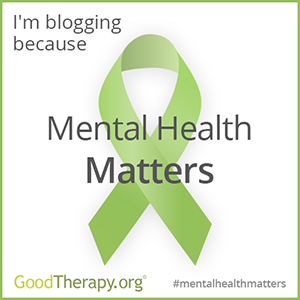 In honor of Mental Health Awareness Month (May), GoodTherapy.org invites you to blog about mental health. If you do, we’ll feature your post on GoodTherapy.org to share with our thousands of readers. Let’s spread the word about why mental health matters!
In honor of Mental Health Awareness Month (May), GoodTherapy.org invites you to blog about mental health. If you do, we’ll feature your post on GoodTherapy.org to share with our thousands of readers. Let’s spread the word about why mental health matters!
In 1949, the U.S. Department of Health and Human Services recognized May as Mental Health Month. Since then, our understanding of mental health issues has grown tremendously. Advances in mental health research and treatment have allowed millions of people to receive the help they need and find the right therapist.
Despite this progress, as few as half of adults with a mental health issue in the United States receive treatment.
There may be many reasons a person does not seek or receive help for his or her mental health concerns, but stigma is one of the most common. One of the main objectives of Mental Health Awareness Month is to reduce the negative stigma sometimes associated with mental health challenges and therapy.
You can help, and GoodTherapy.org can help you get your message out. Simply publish an entry on your personal blog or website during May 2014; your post can be about Mental Health Awareness Month, a message against stigma, and/or a personal story about mental health or therapy. Whether you’re a therapist, a person in therapy, a supporter of someone with mental health concerns, or all of the above, we want to hear from you!
Beginning May 1, GoodTherapy.org will list below qualifying blog posts related to mental health. Tweet us @good_therapy with the hashtag #mentalhealthmatters to let us know about your blog entry, or email us at mentalhealthmatters[at]goodtherapy.org. Post the “I’m Blogging Because Mental Health Matters” seal on your blog and help raise mental health awareness. Just copy and paste the seal below into your post or blog.
Together, we can help reduce stigma, increase knowledge, and let everyone know that mental health matters!
Blog Posts about Why Mental Health Matters
During the month of May, GoodTherapy.org followers write about why mental health matters in support of Mental Health Awareness Month. Posts are listed below in the order in which they have been received.
- Relating Mental Illness to Sexual Assault: for Mental Health Awareness Month, by Angela
- Mental Health Matters, by Calie Adams
- Coming Out: My Father’s Mental Illness and Suicide, by Janine McGraw
- Truth Is Air, by V. ValMar
- May, by Hylarie LeRette
- Mental Health Matters, by Elizabeth Sullivan
- The ‘Ouch’ That Saved Me, by Nancy Simon, LCSW
- Positively Mental, by Brian Swope, MFT
- Investing Time in Personal Growth, by Tracy Ochester
- Why Doesn’t Your Triangle Part Fit in the Circle Puzzle? by “chronicallysickmanicmother” on WordPress
- A Few Thoughts on Mental Health Awareness Month, by Amy Armstrong, LPC
- Can the Media Be Blamed for the Mental Illness Stigma? by Joan Landino
- #ArtTherapyRocks, by Lanie Smith
- Matters of Compassion, by Nellie Lochmore
- Mental Health Awareness Month Seeks to Reduce Stigma, by Emily Kahn-Freedman, LMFT
- Mental Health Awareness Helps Couples Counseling, by Stuart Fensterheim, LCSW
- The Myth of ‘Being Normal’: 3 Reasons People Avoid Therapy, by Chantal Gagnon, PhD, LMHC
- Choosing Who You Want to Be, by Michele Rosenthal
- Happy Mental Health Awareness Month—Or Something, by Rachel Rogel
- The Power of EMDR, by Dr. Carrie Merscham
- Going Nuts to Celebrate Mental Health Month, by Dr. Lynn Somerstein
- Why Mental Health Is Like a Jumbo Shrimp, by Amy Armstrong
Reference:
- Use of Mental Health Services and Treatment Among Adults. (n.d.) National Institute of Mental Health. Retrieved from http://www.nimh.nih.gov/Statistics/3USE_MT_ADULT.shtml




